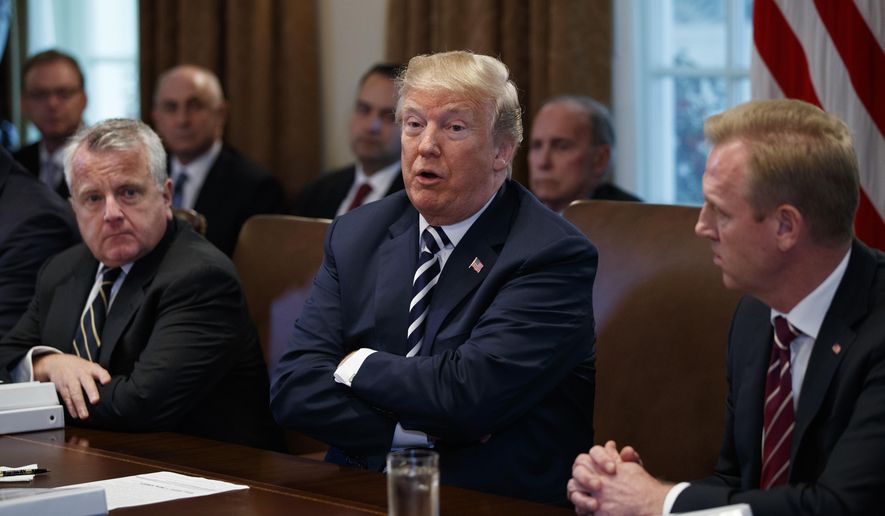OPINION:
As we ponder the wisdom of President Trump’s Iran strategy, consider what’s happening at the other end of Asia.
It would have seemed impossible just a year ago, but North Korea continues to take meaningful steps toward denuclearization by improving relations with its immediate neighbors and by building trust with the U.S.
It was not that long ago that the North Korean regime was firing off ballistic missiles into the Sea of Japan and cruelly killing American college student Otto Warmbier. But Mr. Trump has been strong, consistent and credible with North Korea from the very beginning and now Pyongyang has come to the table to talk.
The lesson of the North Korean nuclear crisis: “Maximum pressure” has worked.
The Trump administration boosted joint military exercises with South Korea and Japan, organized two sweeping sanctions packages under the skillful leadership of U.N. Ambassador Nikki Haley; and convinced Chinese President Xi Jinping to take specific steps to isolate the North Korean regime and cut off Pyongyang’s economic lifeline. In the face of considerable skepticism, the U.S. got China to ban North Korean exports of coal, iron ore, and other raw materials, while putting a cap on oil supplies.
Mr. Trump spent significant time in the early months of his presidency negotiating with China, including an invitation for Mr. Xi to Mar-a-Lago to establish a strong, personal working relationship.
AUDIO: Matt Mackowiak with Danielle Pletka
North Korea and Iran are different challenges, with regional, religious, cultural and historical differences. But many of the principles in one crisis are directly transferable to the other.
In announcing his decision to withdraw from the Iran nuclear deal this week, Mr. Trump rightly said that the move “sends a critical message. The United States no longer makes empty threats.”
From the beginning, Mr. Trump has said that North Korea would not be able to threaten the world with nuclear weapons. That was a promise he made, and it is a promise he intends to keep.
The process with Iran is more complicated.
The Iran deal will begin a wind-down on two tracks, with one track on a 90-day timeline and another on a 180-day timeline.
President Trump did not just withdraw from the deal. He reinstated U.S. nuclear sanctions on the Iranian regime immediately. He also put other nations that do business with Iran on notice that they could also be sanctioned if they continued to do business with the regime in Tehran.
The Iran deal was unbelievably one-sided and not in U.S. interests. It provided massive financial resources to the regime, which the mullahs used to develop new ballistic missiles and underwrite military adventures in Iraq and Syria. The inspection regime under the 2015 accord was weak. And at the end of the deal, Iran still can acquire a nuclear capability. This is unacceptable.
Had the deal been better for American, the Obama administration would have submitted it to the Senate for ratification as a treaty.
As with North Korea, Mr. Trump has been clear and consistent about what Iran has to do to get a new deal that he will sign, including a ban on long-range, nuclear-capable ballistic missiles; stop supporting terrorists, extremists, and regional proxies, such as Hezbollah, Hamas, Yemen’s Houthi rebels and the Taliban; accept the legitimacy of Israel; stop its threats to shipping routes in the region; and end its human rights abuses and unjust detentions of U.S. and other foreign nationals.
It may seem unlikely that a new and improved Iranian nuclear agreement can be reached. But such a deal with North Korea also seemed impossible as recently as six months ago.
It is now clear that the Trump administration will begin a new “maximum pressure campaign” against Iran, with the hope of bringing the regime to the table as it did with North Korea.
• Matt Mackowiak is president of Austin, Texas, and Washington, D.C.-based Potomac Strategy Group. He’s a Republican consultant, a Bush administration and Bush-Cheney re-election campaign veteran and former press secretary to two U.S. senators. His “Mack on Politics” podcast is available on iTunes, Google Play, Stitcher and on WashingtonTimes.com.




Please read our comment policy before commenting.